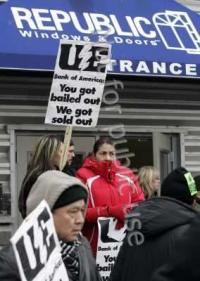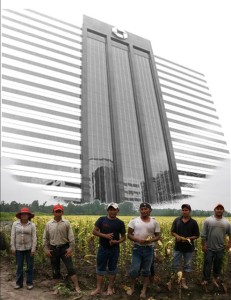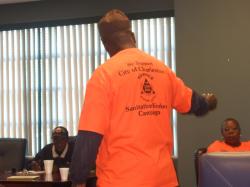by BWFJ

Workers at Republic Windows and Doors, members of UE 1110, picket while other members continue plant takeover.
As millions of workers are losing their jobs and homes with no real relief in sight, they are seeing the government grant over $1 trillion to bailout the big banks and corporations who’s monopolizing and exploitative global financial practices are the major source of the economic crisis. Another trillion has been spent on an unjust and corporate driven war for the control of oil in Iraq and the Middle East.
However, there has been no bailout of the workers – no relief for the housing foreclosures, no improvement in the public schools, more than 40 million lack health insurance, the roads, levees, bridges and other infrastructure is crumbling and the environment is in danger because of the destructive and profits above human needs creed of capitalism.
The Republic workers, the majority being immigrants from throughout Latin America, along with African Americans have witnessed the racist attacks on themselves and their communities by government agencies and the police, and have rightfully lost confidence in the US government to protect their human rights.
Republic workers, like millions of workers throughout the USvoted for Obama in hopes of change that benefits working people. However, the Republic workers recognized that they had to be agents of working class change by setting a direction and calling on those committed to change to support their demands and actions.
The plant occupation symbolized workers exercising their power to control the wealth that they produce that creates profits for the banks and corporations. They are saying by their actions, that a living wage job or income is a human right.
Like Sister Rosa Parks’ refusal to give up her seat on a Montgomery, Alabama bus in 1955, and the sit-in by Black students at the lunch counter in Greensboro, North Carolina in 1960, the Republic workers struggle sends a message, that social movement and human rights unionism means that workers must not allow capital to conduct business as usual.
It is the UE’s rank-and-file democratic principles of trade unionism that allows and encourages workers to exercise real workers power; to decide themselves what sacrifices they are willing to make to fight for their human rights and to build support for their struggles.
In North Carolina and throughout the South where the right of collective bargaining for public sector workers is denied in varying degrees and out of compliance with international human rights standards, and where private sector workers face some of the most vicious corporate and government supported anti union attacks, the workers need a strong social movement and human rights unionism – not a business unionism that makes deals with the bosses and disempowers the workers.
Join with the UE 150 and build a Progressive Organizing Alliance in North Carolina and throughout the South to promote Social Movement and Human Rights Unionism.
 Tell JPMorgan Chase you won’t Bank with a company that ignores tobacco farmworker exploitation.
Tell JPMorgan Chase you won’t Bank with a company that ignores tobacco farmworker exploitation.






